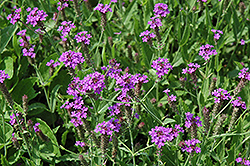It's all about ...
plants

Plant Height: 18 inches
Flower Height: 24 inches
Spacing: 8 inches
Sunlight:
![]()
Hardiness Zone: 6a
Description:
This variety is a vigorous grower producing volumes of silver blue flowers with a hint of lavender; very impressive when massed; stems and leaves tend to be rigid and upright; a bright color accent in the garden or containers
Ornamental Features
Polaris Verbena is smothered in stunning clusters of silvery blue flowers with lavender overtones at the ends of the stems from early summer to early fall. Its deeply cut ferny leaves remain forest green in colour throughout the season.
Landscape Attributes
Polaris Verbena is a dense herbaceous perennial with a mounded form. It brings an extremely fine and delicate texture to the garden composition and should be used to full effect.
This plant will require occasional maintenance and upkeep, and should be cut back in late fall in preparation for winter. It is a good choice for attracting butterflies to your yard. Gardeners should be aware of the following characteristic(s) that may warrant special consideration;
- Spreading
Polaris Verbena is recommended for the following landscape applications;
- Mass Planting
- General Garden Use
- Groundcover
- Naturalizing And Woodland Gardens
Planting & Growing
Polaris Verbena will grow to be about 18 inches tall at maturity extending to 24 inches tall with the flowers, with a spread of 12 inches. When grown in masses or used as a bedding plant, individual plants should be spaced approximately 8 inches apart. Its foliage tends to remain dense right to the ground, not requiring facer plants in front. It grows at a fast rate, and under ideal conditions can be expected to live for approximately 5 years. As an herbaceous perennial, this plant will usually die back to the crown each winter, and will regrow from the base each spring. Be careful not to disturb the crown in late winter when it may not be readily seen!
This plant should only be grown in full sunlight. It is very adaptable to both dry and moist locations, and should do just fine under typical garden conditions. It is not particular as to soil type or pH. It is somewhat tolerant of urban pollution, and will benefit from being planted in a relatively sheltered location. Consider applying a thick mulch around the root zone in winter to protect it in exposed locations or colder microclimates. This is a selection of a native North American species. It can be propagated by division; however, as a cultivated variety, be aware that it may be subject to certain restrictions or prohibitions on propagation.
This plant is not reliably hardy in our region, and certain restrictions may apply; contact the store for more information.
